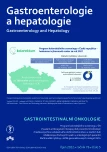The benefit of biosimilar monoclonal antibodies in the therapy of inflammatory bowel diseases
Authors:
Lukáš M.
Authors‘ workplace:
Klinické a výzkumné centrum pro střevní záněty, Klinické centrum ISCARE a. s. a 1. LF UK v Praze
Published in:
Gastroent Hepatol 2022; 76(5): 447-452
Category:
doi:
https://doi.org/10.48095/ccgh2022447
Overview
Nineteen years ago, the biosimilars, “copies” of the original therapeutic monoclonal antibodies, have been introduced in the clinical practice. The beginnig was associated with some confusion from health care providers, but today it is indisputable that their implementation in practice was one of the most significant changes that led to an increase in the availability of biological treatment, cost reduction and significant impact on management of patients with inflammatory bowel diseases.
Keywords:
inflammatory bowel disease – biological treatment – biosimilars
Sources
1. Lukáš M. První generace biologických léčiv – anti-TNF monoklonální protilátky. In: Pokroky v diagnostice a léčbě idiopatických střevních zánětů. Praha: Galén 2019.
2. Jørgensen KK, Olsen IC, Goll GL et al. Switching from originator infliximab to biosimilar CT-P13 compared with maintained treatment with original infliximab (Nor-Switch): a randomized 52 week, double blind, non-inferiority study. Lancet 2017; 389 (10086): 2304–2316. doi: 10.1016/S0140-6736 (17) 30068-5.
3. Statement on the scientific rationale supporting interchangeability of biosimilar medicines in the EU. 2022 [online]. Dostupné z: https: //www.ema.europa.eu/en/news/biosimilar-medicines-can-be-interchanged.
4. Kennedy NA, Heap GA, Green HD et al. Predictors of anti-TNF therapy failure in anti-TNF naive patinetrs with active luminal Crohn’s disease: a prospective, multicentre cohort study. Lancet Gastroenterol Hepatol 2019; 4 (5): 341–353. doi: 10.1016/S2468-1253 (19) 30012-3.
5. Reinisch W, Jang B, Borzan V et al. A novel formulation ofCT-P13 (infliximab biosimilar) for subcutaneous administration: 1 year results from a phase I open label randomized controlled trial in patients with active Crohn’s disease. J Crohns Colitis 2019; 13 (Suppl 1): S066–S067. doi: 10.1093/ecco-jcc/jjy222.096.
6. Lukáš M. Nové subkutánně podávané monoklonální protilátky. In: Idiopatické střevní záněty. Nové trendy amezioborové souvislosti. Praha: Grada Publishing 2020.
7. D’Amico F, Solitano V, Aletaha D et al. Biobetters in patients with immune-mediated inflammatory disorders: An international Delphi consensus. Autoimmun Rev 2021; 20 (7): 102849. doi: 10.1016/j.autrev.2021.102849.
Labels
Paediatric gastroenterology Gastroenterology and hepatology SurgeryArticle was published in
Gastroenterology and Hepatology

2022 Issue 5
- Possibilities of Using Metamizole in the Treatment of Acute Primary Headaches
- Metamizole at a Glance and in Practice – Effective Non-Opioid Analgesic for All Ages
- Metamizole vs. Tramadol in Postoperative Analgesia
- Spasmolytic Effect of Metamizole
- The Importance of Limosilactobacillus reuteri in Administration to Diabetics with Gingivitis
-
All articles in this issue
- Colorectal cancer screening in the Czech Republic in year 2022
- Gastrointestinal oncology
- Colorectal cancer screening program in the Czech Republic – 2021 quality indicators evaluation
- Is it possible to individualize discontinuation of anticoagulant therapy before preventive colonoscopy?
- A rare cause of painless obstructive jaundice in the elderly – a case series
- Bile acid malabsorption in oncology patients
- Multimodal approach in the treatment of generalized malignancies of the gastrointestinal tract
- Endosonography and elastography in the diagnosis of pancreatic neuroendocrine tumors
- The impact of insulin resistance and NAFLD after liver transplantation on patient survival and development of chronic kidney disease
- Stent as a solution for perforation of the “black esophagus”
- The benefit of biosimilar monoclonal antibodies in the therapy of inflammatory bowel diseases
- The selection from international journals
- Správná odpověď na kvíz Syndrom arteria mesenterica superior, syndrom Wilkie
- Kreditovaný autodidaktický test: gastrointestinální onkologie
- Secondary failure of biological treatment – a major challenge for biobetters
- Gastroenterology and Hepatology
- Journal archive
- Current issue
- About the journal
Most read in this issue
- Bile acid malabsorption in oncology patients
- Colorectal cancer screening program in the Czech Republic – 2021 quality indicators evaluation
- Správná odpověď na kvíz Syndrom arteria mesenterica superior, syndrom Wilkie
- Stent as a solution for perforation of the “black esophagus”
